ENERGY EFFICIENCY
| Publication Cover | Title |
|---|---|
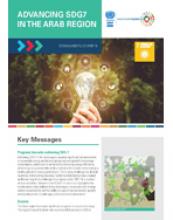 |
Advancing SDG7 in the Arab Region E/ESCWA/2020/POLICY BRIEF.16 Achieving SDG 7 in the Arab region requires significant advancements in renewable energy and in decoupling regional growth from energy consumption, which can be achieved by improving energy... |
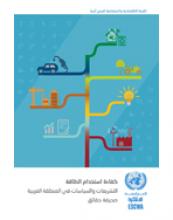 |
Energy efficiency legislations and policies in the Arab region E/ESCWA/SDPD/2019/INF.3 This fact sheet focuses on the status of energy efficiency in the Arab region in terms of goals, institutional frameworks, legislation, policies, performance standards, funding mechanisms for... |
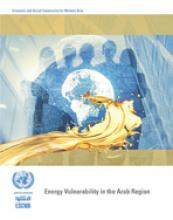 |
Energy Vulnerability in the Arab Region E/ESCWA/SDPD/2019/1 This publication seeks to identify sources of energy vulnerability in the Arab region that prevent member States from being able to ensure universal access to affordable, reliable and modern... |
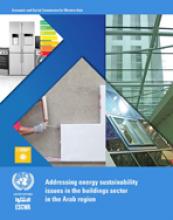 |
Addressing energy sustainability issues in the buildings sector in the Arab region E/ESCWA/SDPD/2018/TP.5 The report focuses on energy efficiency in the buildings sector as a major opportunity for substantial progress towards Sustainable Development Goal (SDG) 7 and provides an evaluation on the... |
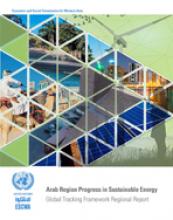 |
Arab Region Progress in Sustainable Energy Global Tracking Framework Regional Report E/ESCWA/SDPD/2017/2 The Arab region lacks sustainable natural resource management, mostly in the areas of energy efficiency and its overwhelming reliance on fossil fuels for virtually all its energy needs. War,... |
 |
Green Technologies in the Energy Sector for Climate Change Mitigation in the ESCWA Region: Fact Sheet E/ESCWA/SDPD/2013/Technical Paper.9 Green technologies have the potential to ensure environment protection and efficient use of resources based on sustainability concept. This Fact Sheet focuses on RE and EE in the electricity... |
 |
Energy Efficiency in Agriculture: the Poultry Section E/ESCWA/SDPD/2012/Technical Paper.5 This document focuses on energy consumption and ways to support sustainability and improve efficiency of energy use in the poultry sector. It gives an overview of the poultry... |
 |
United Nations Economic Commission for Europe: Background Paper on Global Strategy for Energy Efficiency Market Formation to Mitigate Climate Change Non-symbol Paper |
 |
Sustainable Production and Consumption Patterns in Energy and Water Sectors in the ESCWA Region E/ESCWA/SDPD/2011/WP.1 |
 |
Improving Energy Efficicency in the Electric Power Sector in the ESCWA Region E/ESCWA/SDPD/2010/Technical Paper.4 . |
 |
Fact Sheet: Best Practices and Tools for Large-scale Deployment of Renewable Energy (RE) and Energy Efficiency (EE) Techniques E/ESCWA/SDPD/2009/Technical Paper.3 . |
 |
Guidelines for Energy Efficiency in the Tourism Sector: Strategy, Design, Systems and Operations Approach E/ESCWA/PI/2009/14 The primary objectives of this document are to help public and private sector planners, developers and designers, as well as the management and operating staff, in the tourism sector to... |
 |
Energy Conservation and Efficiency in the Upstream Energy Sectors in Selected ESCWA Member Countries E/ESCWA/SDPD/2007/8 Produced in response to the recommendations made in the fifth session of the Committee on Energy, this publication also fulfils the mandates of the Johannesburg Plan of Implementation of the World... |
 |
Improved Energy Efficiency and the Uses of Cleaner Fossil Fuels in Selected Sectors in Certain ESCWA Member Countries, Part II: The Uses of Cleaner Fossil Fuels E/ESCWA/SDPD/2005/1(Part II) While the energy sector plays an important role in achieving economic and social development, the environmental impacts of energy uses call for the adoption of cleaner fuels. The transport sector... |
 |
Improved Energy Efficiency and the Uses of Cleaner Fossil Fuels in Selected Sectors in Certain ESCWA Member Countries, Part I: Improved Energy Efficiency in Energy-Intensive Industries E/ESCWA/SDPD/2005/1(Part I) The industrial sector plays a vital role in the national economies of the ESCWA region and consumes some 25 per cent of total energy. This study is the first volume of a two-part study assessing... |
 |
Improved Energy Efficiency and the Uses of Cleaner Fossil Fuels in Selected Sectors in Certain ESCWA Member Countries, Part I: Improved Energy Efficiency in Energy-Intensive Industries E/ESCWA/SDPD/2005/1(Part 1) The industrial sector plays a vital role in the national economies of the ESCWA region and consumes some 25 per cent of total energy. This study is the first volume of a two-part study assessing... |





